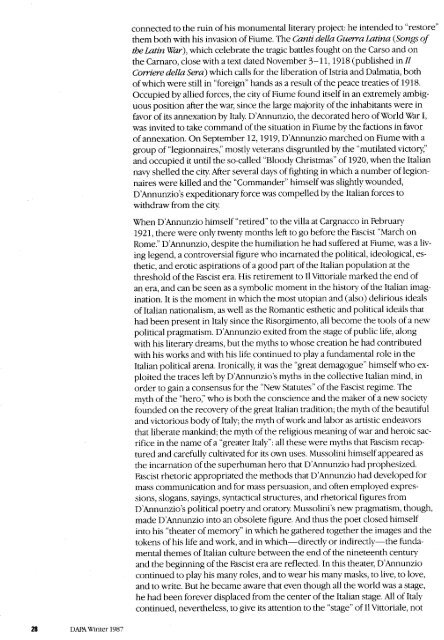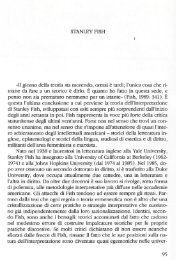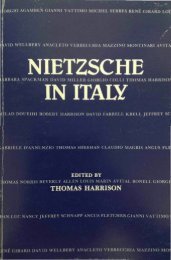The Journal of Decorative and Propaganda Arts - UCLA Department ...
The Journal of Decorative and Propaganda Arts - UCLA Department ...
The Journal of Decorative and Propaganda Arts - UCLA Department ...
You also want an ePaper? Increase the reach of your titles
YUMPU automatically turns print PDFs into web optimized ePapers that Google loves.
n DAPAVinter 1987<br />
connected to the ruin <strong>of</strong> his monumental literary project: he intended to "restore"<br />
them both with his invasion <strong>of</strong> Fiume. <strong>The</strong> Canti della Guerra Latina (Songs <strong>of</strong><br />
the LotintVar),which celebrate the tragic battles fought on the Carso <strong>and</strong> on<br />
the Carnaro, close with a text dated November 3-11, 1918 (published in1l<br />
C<strong>of</strong>fiere dell.a Sera)which calls for the liberation <strong>of</strong> Istria <strong>and</strong> Dalmatia, both<br />
<strong>of</strong> which were still in "foreign" h<strong>and</strong>s as a result <strong>of</strong> the peace treaties <strong>of</strong> 1918.<br />
Occupied by allied forces, the city <strong>of</strong> Fiume found itself in an extremely ambiguous<br />
position after the waq since the large majority <strong>of</strong> the inhabitants were in<br />
favor <strong>of</strong> is annexation by Italy D'Annunzio, the decorated hero <strong>of</strong> \forld\Var I,<br />
was invited to take comm<strong>and</strong> <strong>of</strong> the situation in Fiume by the factions in favor<br />
<strong>of</strong> annexation. On September 72,1919, D'Annunzio marched on Fiume with a<br />
group <strong>of</strong> "legionnaires," mostly veterans disgruntled by the "mutilated victory;'<br />
<strong>and</strong> occupied it until the so-called "Bloody Christmas" <strong>of</strong> 1920,when the Italian<br />
nary shelled the ciry After several days <strong>of</strong> fighting in which a number <strong>of</strong> legionnaires<br />
were killed <strong>and</strong> the "Comm<strong>and</strong>er" himself was slightlywounded,<br />
D'Annunzio's expeditionary force was compelled by the ltalian forces to<br />
withdraw from the city<br />
\X,hen D'Annunzio himself "retired" to the villa at Cargnacco in February<br />
1927,there were only rwenty months left to go before the Fascist<br />
"March on<br />
Rome." D'Annunzio, despite the humiliation he had suffered at Fiume, was a living<br />
legend, a controversial figure who incarnated the political, ideological, esthetic,<br />
<strong>and</strong> erotic aspirations <strong>of</strong> a good part <strong>of</strong> the Italian population at the<br />
threshold <strong>of</strong> the Fascist era. His retirement to I1 Vittoriale marked the end <strong>of</strong><br />
anera, <strong>and</strong> can be seen as a symbolic moment in the history <strong>of</strong> the Italian imagination.<br />
It is the moment in which the most utopian <strong>and</strong> (also) delirious ideals<br />
<strong>of</strong> Italian nationalism, as well as the Romantic esthetic <strong>and</strong> political idedls that<br />
had been present in Italy since the Risorgimento, all become the tools <strong>of</strong> a new<br />
political pragmatism. D'Annunzio exited from the stage <strong>of</strong> public life, along<br />
with his literary dreams, but the m)'ths to whose creation he had contributed<br />
with his works <strong>and</strong> with his life continued to play a fundamental role in the<br />
Italian politic al arena. Ironically it was the "great demagogue" himself who exploited<br />
the traces left by D Annunzio's mlths in the collective Italian mind, in<br />
order to gain a consensus for the "New Statutes" <strong>of</strong> the Fascist regime. <strong>The</strong><br />
mlth <strong>of</strong> the "hero," who is both the conscience <strong>and</strong> the maker <strong>of</strong> a new society<br />
founded on the recovery <strong>of</strong> the great Italian tradition; the myh <strong>of</strong> the beautiful<br />
<strong>and</strong> victorious body <strong>of</strong> Italy; the mlth <strong>of</strong> work <strong>and</strong> labor as artistic endeavors<br />
that liberate mankind; the myh <strong>of</strong> the religious meaning <strong>of</strong> war <strong>and</strong> heroic sacrifice<br />
in the name <strong>of</strong> a "greater Italy": all these were myths that Fascism recaptured<br />
<strong>and</strong> carefully cultivated for its own uses. Mussolini himself appeared as<br />
the incarnation <strong>of</strong> the superhuman hero that D'Annunzio had prophesized.<br />
Fascist rhetoric appropriated the methods that D'Annunziohad developed for<br />
mass communication <strong>and</strong> for mass persuasion, <strong>and</strong> <strong>of</strong>ten employed expressions,<br />
slogans, sayings, syntactical structures, <strong>and</strong> rhetorical figures from<br />
D'Annunzio's political poetry <strong>and</strong> oratory. Mussolini's new pragmatism, though,<br />
made D'Annunzio into an obsolete figure. And thus the poet closed himself<br />
into his "theater <strong>of</strong> memory" in which he gathered together the images <strong>and</strong> the<br />
tokens <strong>of</strong> his life <strong>and</strong> work, <strong>and</strong> in which-directly or indirectly-the fundamental<br />
themes <strong>of</strong> ltalian culture bemveen the end <strong>of</strong> the nineteenth century<br />
<strong>and</strong> the beginning <strong>of</strong> the Fascist eraare reflected. In this theateq D'Annunzio<br />
continued to play his many roles, <strong>and</strong> to wear his many masks, to live, to love,<br />
<strong>and</strong> to write. But he became aware that even though all the world was a stage,<br />
he had been forever displaced from the center <strong>of</strong> the Italian stage. All <strong>of</strong> Italy<br />
continued, nevertheless, to give its attention to the "stage" <strong>of</strong> Il Vittoriale, not




